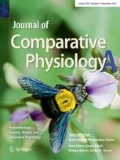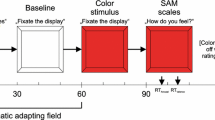Abstract
These studies show that cutaneous stimulation that evoked body wall contraction elicited a concurrent disruption of cardiovascular function. A pinch or test shock to the tail caused a 10- to 30-s increase in diastolic pressure and variability in pulse pressure. Sensitizing cutaneous stimulation which produced enhancement of the tail withdrawal reflex caused no enhancement of the evoked cardiovascular responses. At 20 min post-sensitization training a gradual increase in heart rate was observed and at 60 min post-sensitization training, heart rate was 111 ± 4.3% presensitization values. These long-term changes in cardiovascular function appear to be mediated by the central nervous system. Chemical blockade of conduction at P9 or the pleural-abdominal connectives prevented the sensitization-induced increase in heart rate.
Similar content being viewed by others
Author information
Authors and Affiliations
Additional information
Accepted: 21 May 1999
Rights and permissions
About this article
Cite this article
Krontiris-Litowitz, J. Sensitizing stimulation causes a long-term increase in heart rate in Aplysia californica. J Comp Physiol A 185, 181–186 (1999). https://doi.org/10.1007/s003590050376
Issue Date:
DOI: https://doi.org/10.1007/s003590050376




